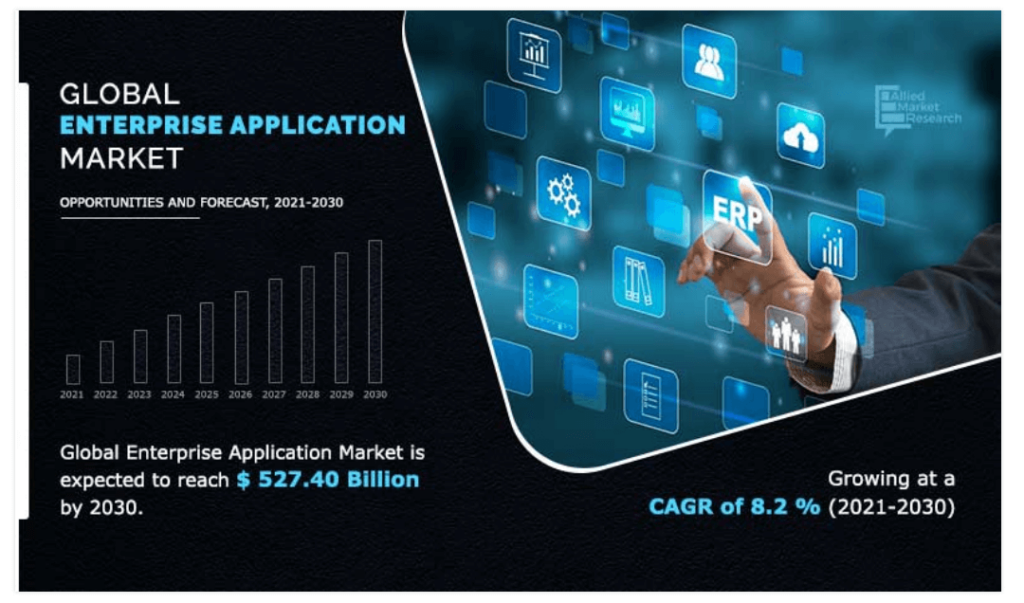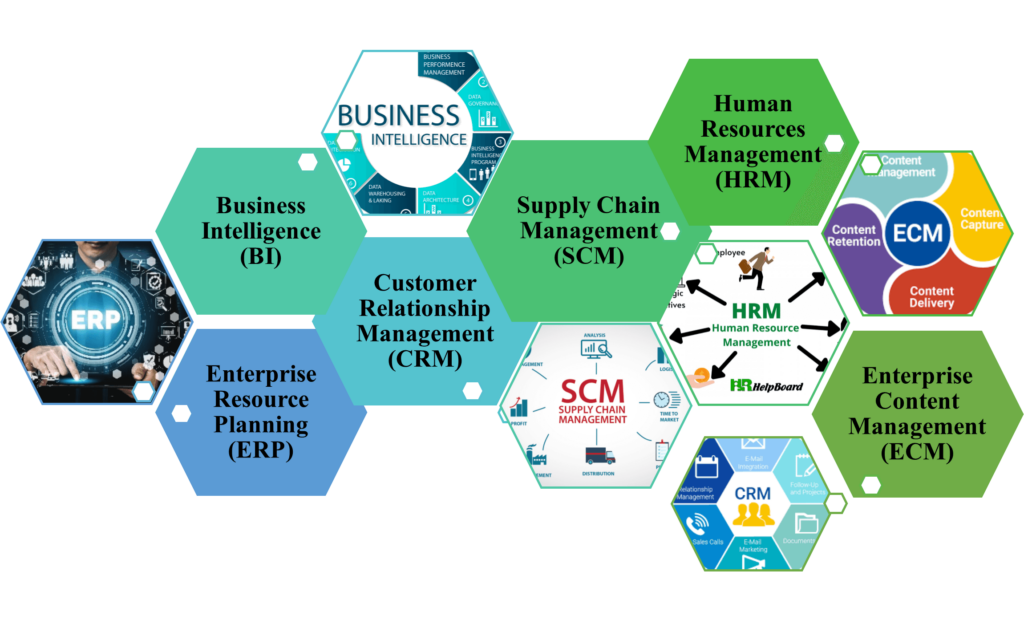Building Custom Enterprise Apps: Best Practices and Strategies
Table of Contents
In reality, when your firms gain new contracts or when your firms expand then it is always a smart move to take digital support in governing the business processes. When you run your business with apps or software then you can automate various functions and you can even take digital control over all your operations.
According to Allied Market Research, forecasted that the global enterprise application will be expected to reach at $ 527.40 billion by the year 2030. It is also analyzed that this industry will grow by 8.2% in the period of 2021 to 2030.

What are Enterprise Apps and its Significance?
Custom Enterprise Apps refer to software applications designed to meet the specific needs of a particular organization or business. They are used to improve productivity, manage operations, and enhance communication within an organization. Enterprise apps can range from customer relationship management (CRM) systems to supply chain management tools and more.
The significance of enterprise apps lies in their ability to streamline business processes and increase efficiency. By using enterprise apps, organizations can automate tasks and workflows, reducing the risk of human error and saving time. This can lead to improved customer satisfaction, increased sales, and higher profits.
For example: Salesforce also includes reporting and analytics features that allow businesses to analyze their sales data and identify areas for improvement. It’s used by a wide range of businesses across various industries, from small startups to large enterprises.

Types Of Enterprise Software Applications
- Enterprise Resource Planning (ERP) – Enterprise software helps organizations to manage their day-to-day business activities, such as accounting, human resources, and supply chain management. It integrates different business functions into a single system to improve efficiency and data visibility.
- Customer Relationship Management (CRM) – CRM software is used to manage a company’s interactions with customers and potential customers. It helps organizations to track customer interactions, manage sales leads, and improve customer engagement.
- Business Intelligence (BI) – BI software provides businesses with tools to analyze their data and make better-informed decisions. It helps organizations to identify trends, patterns, and opportunities to optimize their operations.
- Supply Chain Management (SCM) – SCM software helps businesses manage their supply chain, from procurement to delivery. It helps organizations to optimize inventory levels, reduce costs, and improve supplier relationships.
- Human Resources Management (HRM) – HRM software is used to manage employee data, payroll, benefits, and other HR functions. It streamlines HR processes, improves employee engagement, and enhances compliance with labor regulations.
- Enterprise Content Management (ECM) – ECM software is used to manage and organize digital content, including documents, images, and videos. It helps businesses to improve collaboration, secure data, and streamline content-related workflows.
Top 4 Trends Related to Enterprise App Development
With the increasing amount of sensitive data being stored and transmitted through enterprise apps, security and privacy have become a top priority. Developers are implementing security features such as data encryption, multi-factor authentication, and data loss prevention to ensure that their apps are secure and compliant with privacy regulations.
Furthermore, businesses are taking a holistic approach to cybersecurity, implementing security measures across their entire organization, not just for their apps. So, you can tell to your enterprise mobile app development company to include the below functionalities in your application.
1. Artificial Intelligence & Machine Learning
AI and machine learning are revolutionizing enterprise app development by enabling developers to create intelligent apps that can automate complex tasks and provide personalized experiences for users.
For example: an app can use machine learning algorithms to analyze user behavior and provide recommendations or predict future actions. AI and machine learning can also help businesses to analyze large amounts of data and gain valuable insights to improve their operations.
2. Cloud-Based Services
Cloud-based solutions have transformed the way enterprise apps are hosted and deployed. Rather than relying on on-premise infrastructure, businesses can use cloud-based solutions to access their apps and data from anywhere, on any device. Cloud computing also provides a scalable and flexible infrastructure that can be easily customized to meet the specific needs of a business.
3. Blockchain
Blockchain is a distributed ledger technology that provides a secure, transparent, and decentralized way of storing and sharing data. Enterprise app developers are increasingly using blockchain technology to create apps that can automate processes, increase security, and improve transparency.
For example: blockchain can be used to create smart contracts that automate complex business processes or to create secure digital identities that can be used to authenticate users.
4. Big Data Analytics
Big data analytics is a powerful tool that allows businesses to analyze large amounts of data to gain insights and make better-informed decisions. Enterprise app developers are incorporating big data analytics into their apps to enable businesses to capture, store, and analyze large amounts of data in real time. By doing so, businesses can make data-driven decisions that can improve their operations, enhance customer engagement, and increase revenue.
5. Low-code development
Low-code development is a visual approach to building software applications that allow developers to create apps with minimal coding. This is made possible by the use of drag-and-drop interfaces, pre-built modules, and other tools that simplify the development process. Low-code platforms have become popular because they allow businesses to develop apps faster and at a lower cost, while still maintaining high quality.
Top 8 Best Practices for Enterprise App Development
| Best Practices | Explanation |
#1: Streamline Software Testing with Automation at Each Phase | When you decide to automate each of the software testing phases then you can sample an ample amount of time. Although automation can increase the cost of operations in a short period of time in the long run your business can recover the cost of investment into automated solutions. |
#2: Prioritize Security Throughout the Entire Development Process | Auditing and effective compliance should be your top priority throughout the software development life cycle. |
#3: Adopt Multi-Person Deployment Processes to Avoid Single Points of Failure | Avoid offering rights to only 1 person to hold the keys for deployment. Instead of this, keep careful documentation and utilize tools such as “BuildMaster” to streamline the process. |
#4: Properly Manage Your Enterprise Applications to Ensure Optimal Performance | “ProGet” is the ultimate platform that can help you to manage your project with its universal packages. It allows the users to have dependable infrastructure on their own server. |
#5: Optimize App Performance with Load Balancing Techniques | Utilization of load balancing techniques will help you to monitor all the activities for distributing incoming network traffic. |
#6: Reduce Configuration Drift Across Teams and Locations | Ignoring configuration drift several serious consequences to avoid security breaches and other security outages. |
#7: Organize App Versions for Efficient Tracking and Management | You need to keep your application completely optimized to make sure that versions need to always optimized. |
#8: Keep Up-to-Date with the Latest Development Tools and Technologies | DevOps is a relatively new methodology and you can use tools for automation tools, configuration management tools and diverse enterprise application development. |
Must-Have Features Into Enterprise App Development Process
To make your application fascinating – please add these interactive features to your enterprise mobile application development processes.
Read more: Why you should opt for Building an Enterprise Application?
Feature Multiple User Roles – But Don’t Keep It Open For All Participants
Yes, it is a fact that enterprise apps should have features for multiple users. However, it is important that you should not keep the features open for all participants.
In your application, you should provide customized and useful functionalities for your users but each user should incorporate some degree of functionality to govern the applications in an effective way.
Real-Time Analytics
As your team members or user base will expand – more people will going to leverage the benefits of your application. In such cases, your application should incorporate a real-time analytic function so that you can keep hold track of their activities.
Apart from this, through the use of real-time analytics, you will be also able to analyze which functionalities are being frequently utilized by your users. So, it is crucial that your application should incorporate real-time analytics functions to craft new solutions for your targeted audiences.
Instant Messages For Connecting With Team Members
One of the primary goals for the enterprise application process is to provide space to the team members for open communication as well as for handling the activities. Thus, it is important that your application should also hold a feature of instant messaging so that your team members can communicate effectively with each other.
Read about: How to Outsource Website Development in 2023
Conclusion
From the above discussion, it can be concluded that enterprise applications and software will be going to be a huge investment for your business. These types of applications and software will be going to accelerate your business growth.
At Amplework Software, we effectively emphasize identifying your business requirements and providing you with a profound solution. So, we can create the enterprise application for you that will suit best to your business operations.



 sales@amplework.com
sales@amplework.com
 (+91) 9636-962-228
(+91) 9636-962-228





